-
ORIGINAL ARTICLE
Indigenous women’s experiences about the pregnancy-puerperal cycle
Revista Brasileira de Enfermagem. 2024;77:e20230410
10-11-2024
Abstract
ORIGINAL ARTICLEIndigenous women’s experiences about the pregnancy-puerperal cycle
Revista Brasileira de Enfermagem. 2024;77:e20230410
10-11-2024DOI 10.1590/0034-7167-2023-0410
Views0See moreABSTRACT
Objectives:
to understand the experiences of indigenous women regarding the pregnancy-puerperal cycle.
Methods:
qualitative, exploratory and descriptive research, carried out between May and August 2023 with 27 pregnant women from Indigenous Villages in Mato Grosso, Brazil, through open individual interviews. The data was analyzed using Reflexive thematic analysis.
Results:
data analysis resulted in the following themes: Cultivation of labor and birth in its natural and sacred path; Unique practices and beliefs associated with breastfeeding; Evolved or reductive thinking? The participants suggest inviolable practices and beliefs, which must be welcomed, respected and enhanced by indigenous health teams.
Final Considerations:
the experiences of indigenous women regarding the pregnancy-puerperal cycle are unique and motivated by inviolable cultural and religious beliefs, which transcend scientific knowledge, certainties and the linearity of contemporary approaches, normally established as order.
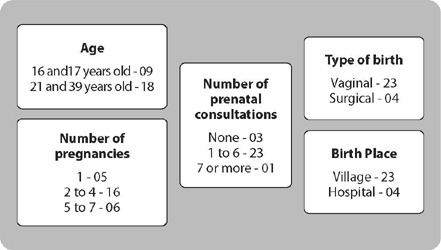
-
ORIGINAL ARTICLE
Indicators of emotional distress and mindfulness in undergraduate students: a cross-sectional study
Revista Brasileira de Enfermagem. 2024;77(5):e20230499
10-07-2024
Abstract
ORIGINAL ARTICLEIndicators of emotional distress and mindfulness in undergraduate students: a cross-sectional study
Revista Brasileira de Enfermagem. 2024;77(5):e20230499
10-07-2024DOI 10.1590/0034-7167-2023-0499
Views0See moreABSTRACT
Objectives:
to assess the association between indicators of emotional distress and dispositional mindfulness in health students at a Brazilian federal public university.
Methods:
a cross-sectional study, developed with university students in the health area of a public institution from May to June 2022. In the analysis, multiple linear regression was used using SPSS software.
Results:
the sample was mostly female, ≤ 22 years old, non-white, studying the first semesters, with a higher prevalence for the medicine course. Students presented moderate dispositional mindfulness scores. It was observed that the variables of stress, depression and current suicide risk were associated with the capacity for mindfulness.
Conclusions:
knowing the indicators of emotional distress that are related to the potential of mindfulness can contribute as a situational diagnosis to better design strategies that promote the improvement of emotional indicators of health students.
-
ORIGINAL ARTICLE
Development and validation of a mobile application prototype for postoperative cardiac surgery
Revista Brasileira de Enfermagem. 2024;77(5):e20230491
10-07-2024
Abstract
ORIGINAL ARTICLEDevelopment and validation of a mobile application prototype for postoperative cardiac surgery
Revista Brasileira de Enfermagem. 2024;77(5):e20230491
10-07-2024DOI 10.1590/0034-7167-2023-0491
Views0See moreABSTRACT
Objectives:
to develop and validate the content, appearance, and semantics of a prototype application for monitoring patients in the postoperative period of cardiac surgery.
Methods:
this is a technological development study based on Contextualized Instructional Design. The content and appearance evaluation was conducted by a committee of specialists, and semantic validation was carried out by patients from a cardiac surgery outpatient clinic.
Results:
the application prototype consisted of 43 screens, validated by 17 health specialists, with content validity ratio and appearance validity index results of 0.86 and 0.99, respectively. For semantic validation, 10 patients participated in data collection, with a total content validity index of 0.978.
Conclusions:
the prototype of the “VivaCor PósOp” application demonstrated evidence of content, appearance, and semantic validity, with the potential to stimulate self-care in patients in the postoperative period of cardiac surgery.
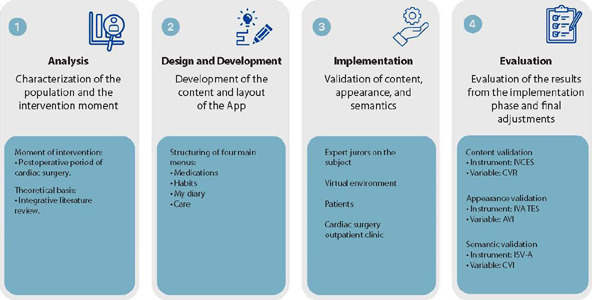
-
REVIEW
Risk factors associated with the occurrence of the adverse event phlebitis in hospitalized adult patients
Revista Brasileira de Enfermagem. 2024;77(5):e20240162
10-07-2024
Abstract
REVIEWRisk factors associated with the occurrence of the adverse event phlebitis in hospitalized adult patients
Revista Brasileira de Enfermagem. 2024;77(5):e20240162
10-07-2024DOI 10.1590/0034-7167-2024-0162
Views0See moreABSTRACT
Objectives:
to synthesize knowledge regarding risk factors associated with occurrence of adverse event phlebitis in hospitalized adult patients.
Methods:
an integrative literature review, carried out in the CINAHL, PubMed, Virtual Health Library, Embase, Web of Science and Scopus databases. The stages were carried out independently by two reviewers, and the data were analyzed descriptively.
Results:
from the analysis of 31 quantitative primary studies, the following risk factors were summarized: length of stay; use of antibiotics; peripheral intravenous catheter dwell time; receive less nursing care; catheter inserted multiple times; patients with infection and comorbidities; presence of pain at catheter insertion site; Teflon® catheter use; reduced patient mobility; quality of patient’s vein; skin elasticity; unsuccessful insertion.
Conclusions:
it is necessary to standardize the format for measuring occurrence of this adverse event and develop new studies with a higher level of evidence.
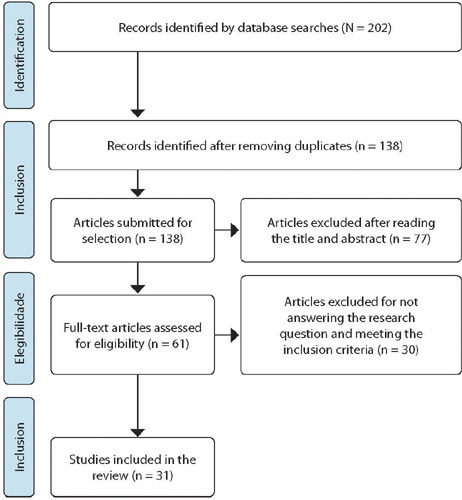
-
ORIGINAL ARTICLE
Consequences of the legislation issued for nursing education in times of COVID-19 (2020-2022)
Revista Brasileira de Enfermagem. 2024;77(5):e20230375
10-07-2024
Abstract
ORIGINAL ARTICLEConsequences of the legislation issued for nursing education in times of COVID-19 (2020-2022)
Revista Brasileira de Enfermagem. 2024;77(5):e20230375
10-07-2024DOI 10.1590/0034-7167-2023-0375
Views0See moreABSTRACT
Objectives:
to analyze the legislation issued during the COVID-19 pandemic for nursing education and immediate consequences.
Methods:
documentary research, whose source was the legislation issued for nursing education during the COVID-19 pandemic. Thirty-two documents were analyzed and submitted to a collection instrument.
Results:
contradictions and consequences for nursing education following the guidelines and law of guidelines and bases were revealed. The consequences of the law affected the quality of teaching, equal access, exemption from minimum school days and course abbreviation. Regarding the guidelines, there was a lack of conditions for developing skills, in addition to the attempt to update them. Concerning internships, acting during the pandemic put students at risk, and their abbreviation prevented them from consolidating knowledge and skills.
Final Considerations:
remote teaching did not guarantee the quality and equality of teaching, weakened the development of skills, not taking into account nursing’s educational needs.

-
ORIGINAL ARTICLE
Educational video for adherence to vaginal pessary in pelvic organ prolapse treatment
Revista Brasileira de Enfermagem. 2024;77:e20230515
09-30-2024
Abstract
ORIGINAL ARTICLEEducational video for adherence to vaginal pessary in pelvic organ prolapse treatment
Revista Brasileira de Enfermagem. 2024;77:e20230515
09-30-2024DOI 10.1590/0034-7167-2023-0515
Views0ABSTRACT
Objectives:
to construct and assess an educational video to promote the adherence of women with pelvic organ prolapse to vaginal pessary use.
Methods:
this is a methodological study, with a longitudinal design and quantitative analysis. The pre-production (synopsis, argument, script, storyboard), production and post-production stages were covered. Content and technical assessments were carried out by judges from the health and communication areas, respectively, and appearance assessment by the target audience.
Results:
the video was the first to be developed on the topic on the national scene, considered assessed from the point of view of appearance and content, presenting an overall Content Validity Index of 0.99 and a level of agreement among judges of 91.1% to 100%. Assessment by the target audience reached a percentage of 96% to 100%.
Conclusions:
the educational video is an instrument capable of promoting adherence to pessary in women indicated for this therapeutic approach.
Keywords:Health CommunicationInstructional Film and VideoPelvic Organ ProlapsePessariesTreatment Adherence and ComplianceSee more
-
EXPERIENCE REPORT
Health promotion of long-haul truck drivers and their families
Revista Brasileira de Enfermagem. 2024;77:e20230511
09-30-2024
Abstract
EXPERIENCE REPORTHealth promotion of long-haul truck drivers and their families
Revista Brasileira de Enfermagem. 2024;77:e20230511
09-30-2024DOI 10.1590/0034-7167-2023-0511
Views0ABSTRACT
Objectives:
to describe the development of a Health Information and Communication Technology for the health care of long-haul truck drivers and their families.
Methods:
this is a description of the development of an Information and Communication Technology, developed from March to September 2023, following the systematization of the experience in five steps: 1) starting point, 2) initial questions, 3) recovery of the lived process, 4) background reflection, and 5) arrival points.
Results:
the technology called “Work-Family Balance,” electronically available, presents resources for the health care of long-haul truck drivers. It is anchored in studies on the health of long-haul truck drivers, notes from the International Labor Organization, the Strategic Action Plan for Confronting Chronic Diseases and Non-Communicable Diseases in Brazil, 2021-2030, and the Declaration by the International Association of Family Nursing.
Final Considerations:
the theoretical improvement of nursing can potentially improve the health care of long-haul truck drivers, prevent Chronic Non-Communicable Diseases, and promote work-life balance to achieve the goals of Agenda 2030.
Keywords:Family HealthInformation TechnologyNoncommunicable DiseasesSustainable DevelopmentWork-Life BalanceSee more
-
ORIGINAL ARTICLE
Giving new meaning to the impact of touch in Shantala massage: mothers’ perceptions of maternal and child well-being
Revista Brasileira de Enfermagem. 2024;77:e20240012
09-30-2024
Abstract
ORIGINAL ARTICLEGiving new meaning to the impact of touch in Shantala massage: mothers’ perceptions of maternal and child well-being
Revista Brasileira de Enfermagem. 2024;77:e20240012
09-30-2024DOI 10.1590/0034-7167-2024-0012
Views0See moreABSTRACT
Objectives:
to understand maternal perceptions of maternal and child well-being based on Shantala massage and discuss its association with the third Sustainable Development Goal.
Methods:
a descriptive-exploratory study in the light of Symbolic Interactionism. Eight women, mothers of infants, participated in five online meetings to teach Shantala massage, collected in focus groups, between November and December 2021. The data was subjected to thematic content analysis and lexical analysis with IRAMUTEQ®.
Results:
two categories emerged, 1) Maternal perceptions of Shantala massage and its promotion of child well-being and 2) Maternal perceptions of Shantala massage and its impact on their well-being, interconnected with subcategories.
Final Considerations:
Shantala massage promoted mutual impacts on maternal and child well-being, working together to achieve the third Sustainable Development Goal.

-
ORIGINAL ARTICLE
Changes implemented in the work environment of nurses in the COVID-19 pandemic
Revista Brasileira de Enfermagem. 2022;75:e20201381
11-29-2022
Abstract
ORIGINAL ARTICLEChanges implemented in the work environment of nurses in the COVID-19 pandemic
Revista Brasileira de Enfermagem. 2022;75:e20201381
11-29-2022DOI 10.1590/0034-7167-2020-1381
Views0See moreABSTRACT
Objective:
to describe the changes implemented in the work environment of nurses in university hospitals considering the COVID-19 pandemic.
Methods:
this qualitative and descriptive research was developed from an online survey with 75 nurses from three Brazilian university hospitals. Data processing occurred through textual analysis with the aid of software IRAMUTEQ.
Results:
five semantic classes were obtained: Organization of units for exclusive care of patients with COVID-19; Adaptations in the use of personal protective equipment; Physical structure adaptation; Care flow institution; Increased number of beds and training courses. Final considerations: the results show the effort of healthcare and nursing professionals/managers in the development of structural adaptations and reorganizations of care processes, in the hospital context, to respond with quality and efficiency to the demands arising from the COVID-19 pandemic.
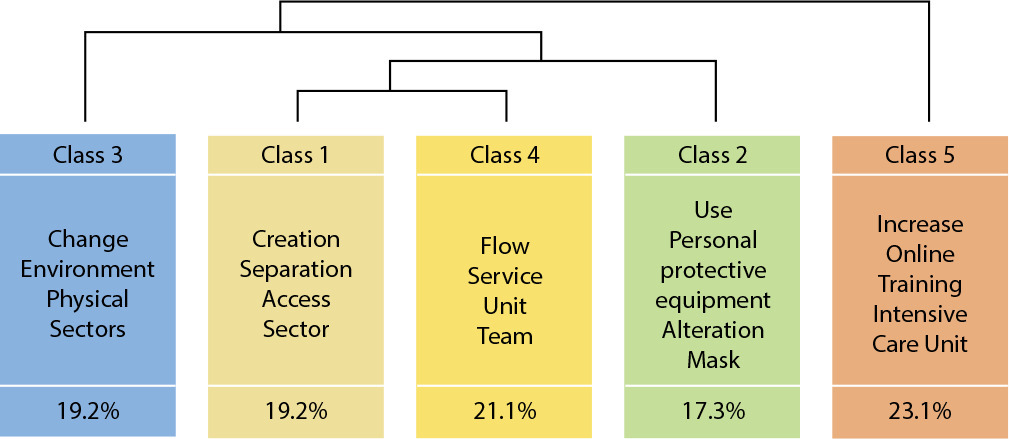
-
ORIGINAL ARTICLE
Permanent education for good practices in the prevention of pressure injury: almost-experiment
Revista Brasileira de Enfermagem. 2019;72(6):1646-1652
10-21-2019
Abstract
ORIGINAL ARTICLEPermanent education for good practices in the prevention of pressure injury: almost-experiment
Revista Brasileira de Enfermagem. 2019;72(6):1646-1652
10-21-2019DOI 10.1590/0034-7167-2018-0778
Views0See moreABSTRACT
Objective:
To verify the effectiveness of the educational intervention through the evaluation of nurses’ knowledge about prevention of pressure injury.
Method:
A quasi-experimental study with a single group, carried out with 95 nurses from a teaching hospital in the interior of Minas Gerais, in August and September 2017. As a teaching strategy, the active methodology and hybrid teaching were used, based on the reference of the Method of the Arch of Charles Maguerez. Data were collected from a validated instrument, called the Pieper Knowledge Test, and analyzed by descriptive statistics and Student’s t-test with significance level of p <0.001.
Results:
The mean number of correct answers obtained by the nurses was 78.8% in the pre-test and 88.8% in the post-test, and the difference was statistically significant (p <0.001).
Conclusion:
The educational intervention developed was effective, since it contributed to the improvement of nurses’ knowledge.

-
ORIGINAL ARTICLE
Nurse care for the hospitalized elderly’s spiritual dimension
Revista Brasileira de Enfermagem. 2019;72:236-242
12-05-2019
Abstract
ORIGINAL ARTICLENurse care for the hospitalized elderly’s spiritual dimension
Revista Brasileira de Enfermagem. 2019;72:236-242
12-05-2019DOI 10.1590/0034-7167-2018-0685
Views0See moreABSTRACT
Objective:
to analyze the nurse care for the spiritual hospitalized elderly’s dimension.
Method:
a qualitative study, based on Jean Watson’s Theory of Human Caring. The study included 17 nurses working in a geriatric center in Salvador City, Bahia State, Brazil. The collection of testimonies occurred between January and April of 2018, through an interview.
Results:
spiritual care were dialogue, encouragement and respect for religious activities, embracement, empathy. One of the obstacles to providing this care was the lack of preparation in accessing the elderly’s spiritual dimension.
Final considerations:
spirituality is a dimension of human and holistic nursing care. Caring for the spirit contributes to foster transpersonal care. The difficulty may be in the lack of nurses’ preparation. It is necessary that they cultivate and live their own spirituality, transmitting the understanding in each care relationship.
-
EXPERIENCE REPORT
Use of webQDA software on qualitative nursing research: an experience report
Revista Brasileira de Enfermagem. 2020;73(3):e20180411
04-03-2020
Abstract
EXPERIENCE REPORTUse of webQDA software on qualitative nursing research: an experience report
Revista Brasileira de Enfermagem. 2020;73(3):e20180411
04-03-2020DOI 10.1590/0034-7167-2018-0411
Views0See moreABSTRACT
Objectives:
to report the user experience of the webQDA software in the support of qualitative data analysis about health literacy of older adults.
Methods:
quasi-experimental research developed from January 2014 to January 2015, with 118 older adults, all of whom were interviewed to assess the level of health literacy. Interviews were carried out before and after four educational interventions, according to Freire’s method named Culture Circle. The interviews were transcribed and entered in the software, which highlighted the analytical categories.
Results:
the systems of sources, interpretative encoding and questioning of the data available in the software allowed the construction of three categories for the literacy levels and four categories for their dimensions.
Final considerations:
We concluded that the webQDA software enables the structured encoding of qualitative materials, ensuring faster and effective management of data with systematization and analytical transparency.

-
Concept analysis of Perioperative Thirst for the development of a new nursing diagnosis
Revista Brasileira de Enfermagem. 2021;74(1):e20200065
03-03-2021
Abstract
Concept analysis of Perioperative Thirst for the development of a new nursing diagnosis
Revista Brasileira de Enfermagem. 2021;74(1):e20200065
03-03-2021DOI 10.1590/0034-7167-2020-0065
Views0See moreABSTRACT
Objectives:
to analyze the perioperative thirst concept for the development of a new diagnostic structure according to NANDA International.
Methods:
a concept analysis study based on the framework proposed by Walker and Avant, instrumentalized through an integrative literature review based on SCOPUS, CINAHL, PUBMED, LILACS, and WOS. The elaboration of the diagnostic structure followed NANDA International guidelines.
Results:
41 studies were analyzed revealing that perioperative thirst is prevalent and intense, having visceral and behavioral attributes as the core of the concept. Antecedents indicate that surgical patients are vulnerable to thirst; and consequents 16 signs and symptoms were organized and model cases were developed. A diagnostic structure has been developed for perioperative thirst.
Final Considerations:
concept analysis allowed language standardization that describes thirsty patients, helping the identification, planning of actions and communication of perioperative nursing care.
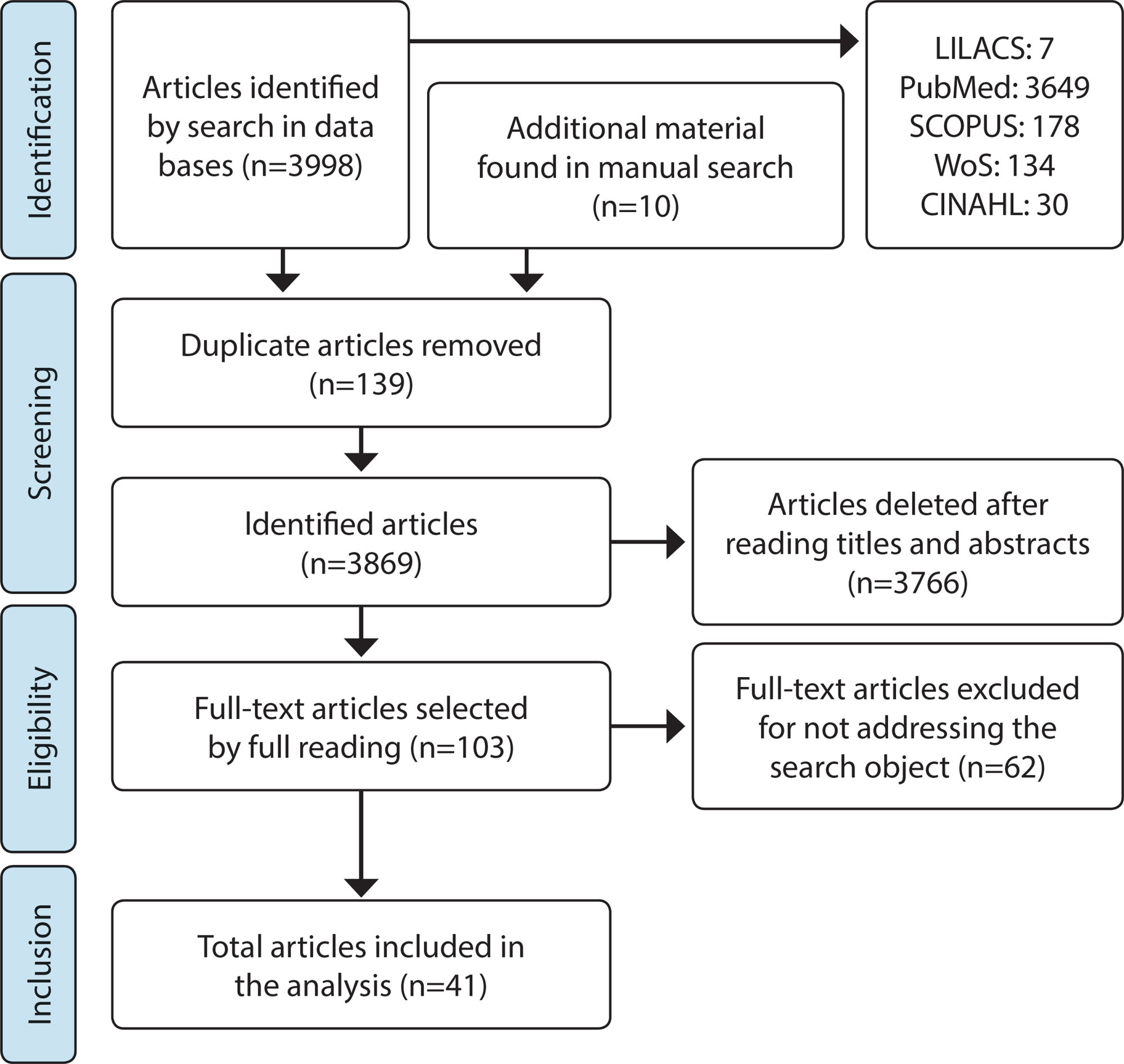
-
REFLECTION
Nursing Process in the Brazilian context: reflection on its concept and legislation
Revista Brasileira de Enfermagem. 2022;75(6):e20210898
05-11-2022
Abstract
REFLECTIONNursing Process in the Brazilian context: reflection on its concept and legislation
Revista Brasileira de Enfermagem. 2022;75(6):e20210898
05-11-2022DOI 10.1590/0034-7167-2021-0898
Views0ABSTRACT
Objectives:
to reflect on the global understanding of the Nursing Process concept, with emphasis on the Brazilian context.
Methods:
a reflection article, aligned with the vision and expertise of researchers who are members of the Nursing Process Research Network.
Results:
the reflection is presented in two main topics: The evolution of Systematization of Nursing Care X Nursing Process concepts and its consonance with national and international practices, and Brazilian legislation; The Nursing Process concept realignment in Brazilian legislation in line with current care, teaching and research practices. Final Considerations: the reflections were oriented to the Nursing Process’ conceptual, normative and legal issues, including elements of its historical evolution, and, with that, pointed to the need to modify the Brazilian regulation on the Nursing Process.
Keywords:Education, NursingLegislationNursingNursing CareNursing ProcessStandardized Nursing TerminologySee more -
ORIGINAL ARTICLE
Creation and validation of a visual educational technology content for lactation physiology learning
Revista Brasileira de Enfermagem. 2020;73(6):e20190564
09-07-2020
Abstract
ORIGINAL ARTICLECreation and validation of a visual educational technology content for lactation physiology learning
Revista Brasileira de Enfermagem. 2020;73(6):e20190564
09-07-2020DOI 10.1590/0034-7167-2019-0564
Views0ABSTRACT
Objective:
to create and validate a visual educational technology content for lactation physiology learning.
Method:
a methodological study that contemplated the stages of content creation and validation guided by the conceptual model of Knowledge Translation into action. The creation took place in partnership with the educational technology center of the project’s home institution. The validation was attended by 27 judges with experience in the obstetric, neonatal, pediatric or maternal and child areas and in the theme of breastfeeding.
Results:
an educational technology covered animation and video techniques to locate, respectively, elements of lactation physiology and the population involved. An Overall Content Validity Index of 0.84 was obtained.
Conclusion:
the visual educational technology for lactation physiology learning has been validated in content as a tool to introduce the theme and mediate health education actions that can have a positive impact on breastfeeding.
Keywords:Audiovisual ResourcesEducational TechnologyHealth EducationLactationTranslational Medical ResearchSee more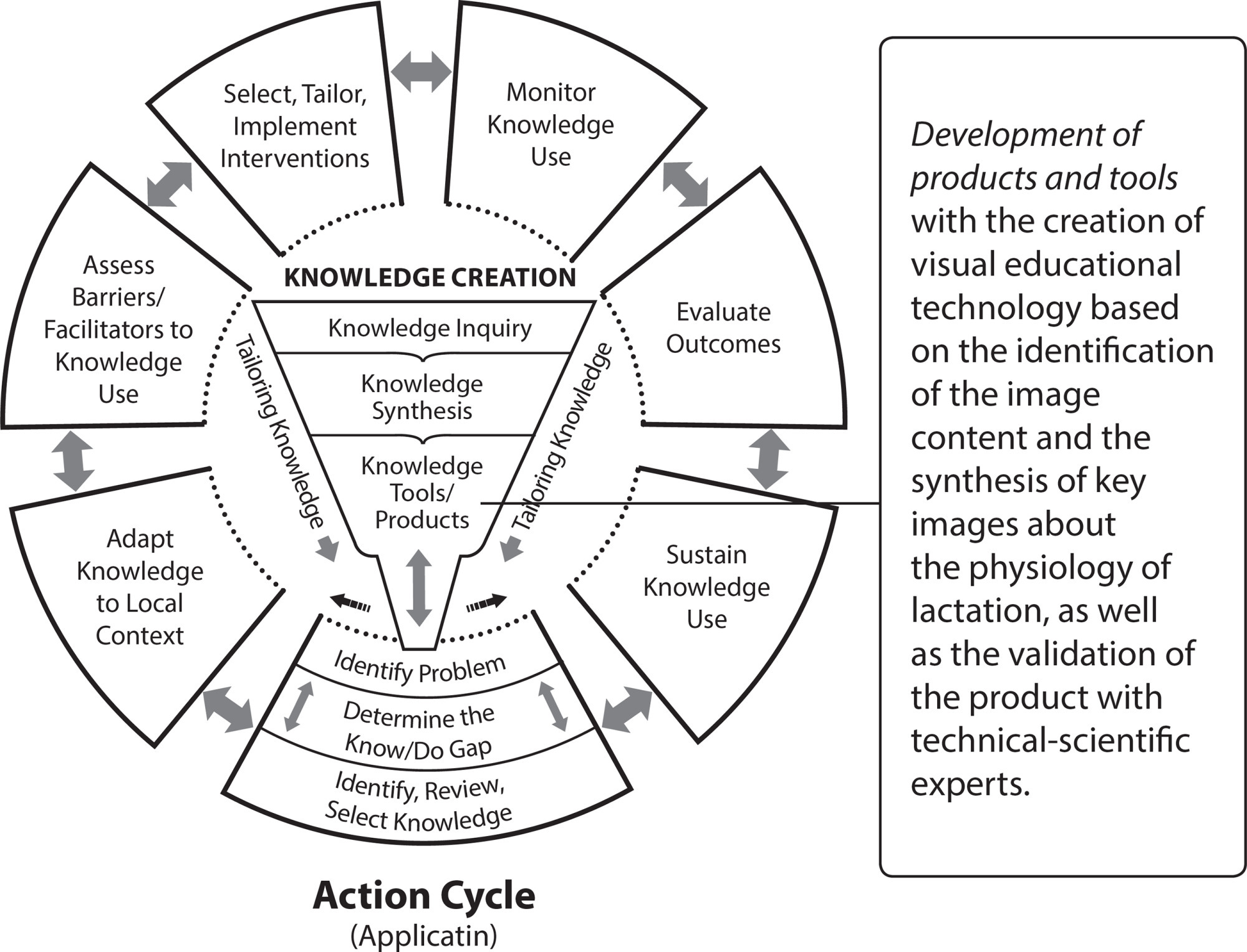
-
ORIGINAL ARTICLE
Risk of suicide among nursing students
Revista Brasileira de Enfermagem. 2021;74(6):e20200867
08-20-2021
Abstract
ORIGINAL ARTICLERisk of suicide among nursing students
Revista Brasileira de Enfermagem. 2021;74(6):e20200867
08-20-2021DOI 10.1590/0034-7167-2020-0867
Views0See moreABSTRACT
Objectives:
to identify the risk and degree of risk of suicide in nursing students of a public institution in the countryside of Pernambuco, Brazil.
Methods:
this was a cross-sectional, quantitative research conducted with 150 students. For data collection, a sociodemographic questionnaire and the instrument, M.I.N.I. – Brazilian version 5.0.0 – Module C – Risk of suicide were used. Statistical analyses were performed with IBM(® )SPSS(®), version 23.
Results:
53.3% of nursing students had a risk of suicide, of which 20.7% had a high risk. Moreover, 22.67% reported previous suicide attempt. It is noteworthy that students without a partner have a higher risk of suicide (56.8%) than those with a partner (29.4%).
Conclusions:
it is perceived the need to develop programs that identify students at risk of suicide in higher education institutions, in order to raise awareness of the problem and implement policies to promote mental health in the academia.
Search
Search in:
Nuvem de Tags
Aged (144) Atenção Primária à Saúde (239) COVID-19 (104) Cuidados de Enfermagem (269) Educação em Enfermagem (151) Educação em Saúde (139) Enfermagem (930) Estudos de Validação (131) Health Education (144) Idoso (208) Mental Health (149) Nursing (987) Nursing Care (306) Patient Safety (151) Primary Health Care (284) Qualidade de Vida (104) Quality of Life (106) Saúde Mental (145) Segurança do Paciente (150) Validation Studies (108)



